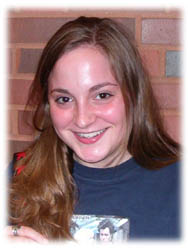| EN170 Haiku Writing Roundtable Dr. Randy Brooks Millikin University • Fall 2004 |
|
|
Yesterday's Makeup
|
|
I have always liked to think of myself as a writer, mostly of poems and short stories. Before this class, I had never really written haiku seriously (except for one when I was seven—I only remember it because I had to read it in front of my entire elementary school!). I must admit this—writing haiku is difficult! I have written over 100 haiku attempts this semester, but I now present you with only a few of the best. I have discarded most of what I have written as trash not worth keeping around, but the ones I like—they are my treasures. I am so proud of each and every one, because I know the work I put into it. Yes, these three-liners took me a lot of hard work! You probably wouldn't believe how much time some of these took me to write . . . and rewrite . . . and rewrite again (unless you're a writer of haiku, also, in which case you probably feel my pain). At any rate, I hope you find as much joy in reading them as I found in writing them. Foreword by Eric Van Natta, author of Loose-leaf Philosophy With the advent of t.v., the Internet, and other forms of technology, the world is becoming a much faster, more competitive place. Thus, it is getting increasingly harder and harder to stop and smell the flowers, to find that quite place of the soul not yet tainted by man's desire for physical dominance. This is where the written word comes in, granting us permission to slow everything down, especially when we no longer know how. I personally feel the purest form of writing is poetry, and perhaps the purest form of poetry is haiku. Haiku is basically the minimum amount of words for the maximum amount of impact, akin to a prayer from a devoted believer saying "I love you" and actually meaning it. People do not read as much as we used to, mostly because we are too frazzled from modern life to focus inward, a result generated by this spiritually deflated culture. A lot of people tell me that they simply do not have the time to read. This surprises me since we watch more t.v. than ever before, with shows about swapping spouses and eating walrus genitals. If time is truly the case, one should consider haiku, for a few moments of reading can nurture a lifetime of enlightenment. The following is a selection of haiku from a gifted young writer who understands the need for immediate beauty intuitively, as shown by her poignant work. She touches on subjects from the solitude of nature to the complexities of love to the chaos of the party scene. I find myself deeply touched by the raw genius that is her work. I'm confident that as you turn these pages, you will be touched as well. |
|
|
i draw back the curtains |
|
crumpled sheets |
|
stepping outside |
|
walking through This is a crowning moment in Jenn's collection. This haiku exudes a mature Zen, sabii tone. While she is alone, the mushroom! This shows her increased awareness when she is allowed to just be and observe the world around her. This haiku captures the moment well—a simple observation taken to a higher level of beautry and importance. —Emily Evans |
|
sitting across the table |
|
yesterday's makeup |
|
new tattoo-- |
|
his gentle snore |
|
too much tequila |
|
|
midnight rain |
|
the bartender I chose this haiku to respond to because it opened a situation in my mind. There is a lot in this haiku, but said very subtly. The author was obviously observing the bartender . . . but was the author alone, and therefore had no one to talk to, therefore watching the bartender? Was the bartender bored, and cleaning everything? Maybe it was a slow night, and the author is one of the only people in the bar? There are great undertones in this haiku, with enough empty space for questions. It is observant, and ha a sabi sense of loneliness. The money you paid for a beer was worth the creation of this poem. —Emily Evans |
©2004 Randy Brooks, Millikin University, Decatur, Illinois || all rights reserved for original authors
